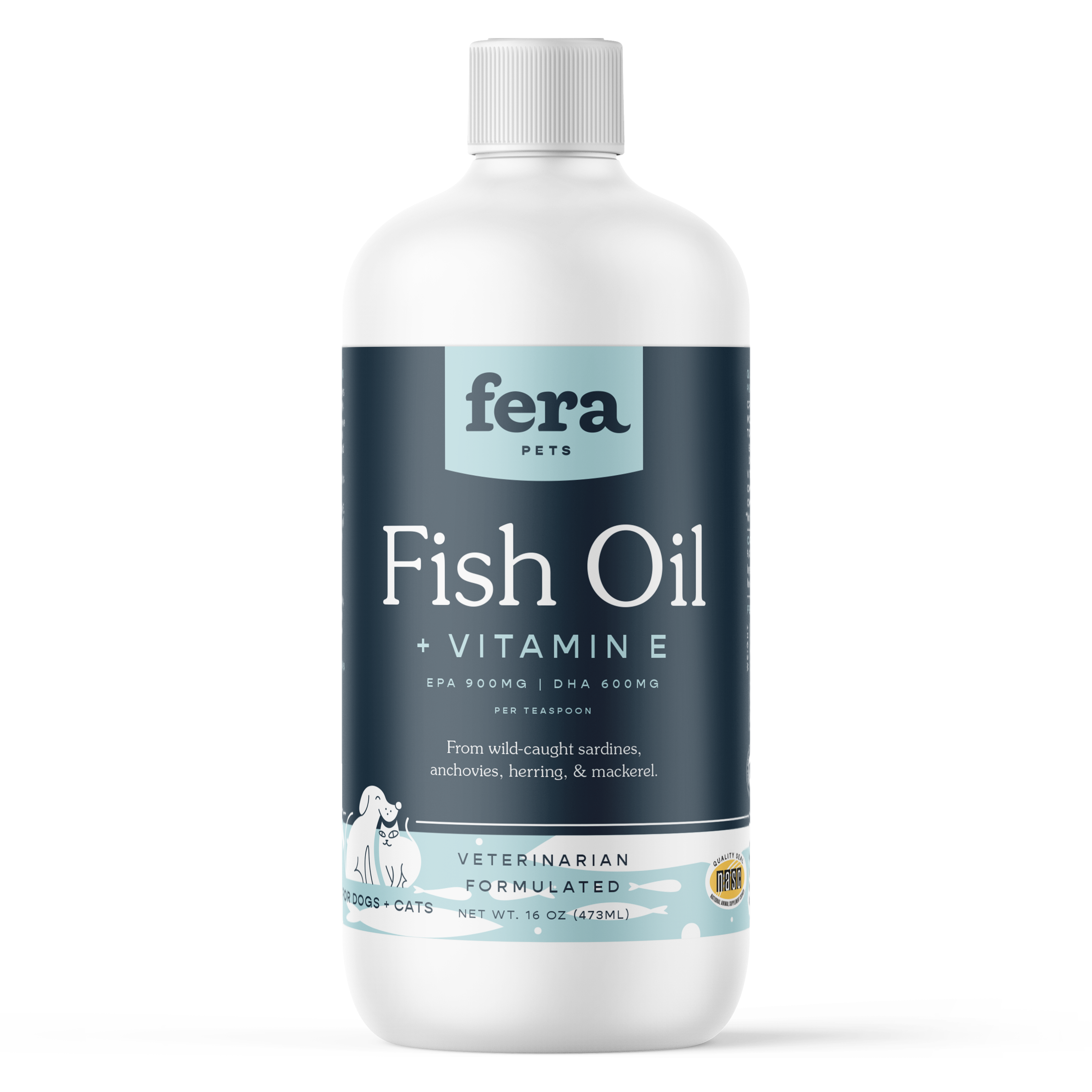Fish Oil for Dogs and Cats and Why It’s Fin-tastic for Your Pets
Unlock the secret to a healthier pet with fish oil! Packed with Omega-3 fatty acids, fish oil enhances your companion's skin, coat, joints, heart, brain, and immune system. Discover how to choose the right fish oil for your pet, and why it's the game-changer your furry friend needs
An increasing number of pet parents are on the lookout for ways to enhance their furry friend’s well-being, and fish oil has garnered plenty of attention along the way. With an abundance of essential vitamins and minerals, there’s nothing fishy as to why this pet supplement can be a game-changer for our beloved companions.
Here are some of the many advantages of fish oil for dogs and cats and what to look for in a high-quality pet supplement.
5 Reasons to Try Fish Oil for Dogs and Cats
1. The Power of Omega-3 Fatty Acids
Fish oil is a rich source of omega-3 fatty acids, specifically eicosapentaenoic acid (EPA) and docosahexaenoic acid (DHA). These essential fatty acids can support various aspects of your furry friend’s overall health.
2. Skin and Coat
Ingredients containing omega-3 fatty acids are a go-to for our pets’ skin and coat health, and for good reason. They can promote a lustrous and healthy coat and may help reduce itching, dryness, and flakiness.
3. Joint Health
Aging or active pets are often prone to painful joint issues. Omega-3 fatty acids help decrease normal inflammatory pathways and can help alleviate joint pain, making it an ideal supplement for senior pets or those with arthritis.
4. Cardiovascular Health
Just as omega-3s benefit the human heart, they are equally beneficial for pets. Fish oil supports cardiovascular health by maintaining proper blood circulation and promoting vascular reactivity.
5. Cognitive Function
DHA is essential for brain development and cognitive function. Adding fish oil to your pet's diet can support mental acuity, making it particularly valuable for aging pets.
6. Immune System Support
The omega-3 fatty acids present in fish oil play a vital role in immune system support. By maintaining immune system response, fish oil can help your pets better fend off infections and illnesses.
Tips for Choosing the Right Fish Oil Supplement
Purity and Source
Opt for fish oil derived from cold-water, small fatty fish such as anchovies, , mackerel, or sardines since these fish are less likely to contain harmful contaminants like mercury. Also, look for supplements that are molecularly distilled to ensure purity.
Omega-3 Content
The concentration of EPA and DHA is one of the most important things to confirm when choosing fish oil for dogs and cats. Higher concentrations typically mean more potent effects, so check the label for optimal levels.
Formulation
Fish oil can be offered to your pet in several different forms, and finding the one best suited to your furry friend will be up to you. Liquid tinctures are often more palatable for pets and easier to mix into their food. However, capsules or chewable tablets make great alternative options.
Additives and Fillers
Read the ingredient list carefully. If the fish oil is filled with unnecessary additives, preservatives, or fillers that may compromise the overall quality of the product, it’s best to give it a pass.
Freshness
Fish oil can become rancid over time, losing its efficacy and potentially causing harm. Choose supplements that are packaged in dark, opaque bottles to protect against light exposure, refrigerate after opening, and of course, check for expiration dates to ensure freshness.
Vitamin E
Fish oil needs Vitamin E to be processed by the body, which is why taking these supplements can sometimes lead to Vitamin E deficiency. If possible, find a fish oil that includes Vitamin E to prevent any deficiencies.
Navigating the Waters: Potential Side Effects of Fish Oil for Pets
While fish oil offers a myriad of benefits for pets, it's important to be aware of the rare yet not unheard-of side effects to ensure it’s the right choice for your furry friend.
Gastrointestinal Upset
Introducing fish oil too quickly or in excessive amounts may lead to gastrointestinal upset in some pets. Common signs include diarrhea, vomiting, or a change in appetite. To avoid this, start with a smaller dose and gradually increase it, monitoring your pet's response.
Allergic Reactions
While fish oil is generally well-tolerated, some pets may be allergic to fish proteins. Monitor your pet for signs of an allergic reaction, including itching, swelling, or difficulty breathing. If you observe any of these symptoms, discontinue the supplement and seek veterinary advice.
Interactions with Medications
Fish oil may interact with certain medications, particularly those affecting blood clotting. If your pet is taking medications, consult your veterinarian to ensure there are no potential interactions that could compromise their health.
I encourage pet parents to discuss any changes to their companion’s diet, including supplements like fish oil, with their veterinarian beforehand. If you have any questions or concerns, don’t hesitate to give them a call and ask for their professional opinion based on your pet’s current health profile.
Did You Find This Information Helpful? There’s More Where That Came From!
Get veterinarian-approved health tips, pet treat recipes, exclusive deals on pet supplements, and more by joining the Fera family! Just sign up for our newsletter and consider yourself a part of the club. We’re happy to have you with us.
Sources:





